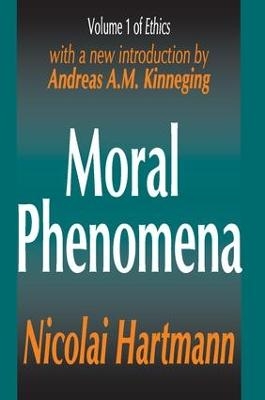
Moral Phenomena
Transaction Publishers (Verlag)
978-0-7658-0909-4 (ISBN)
In 1926, Hartmann published a massive treatise, Ethik, which was translated into English by Stanton Coit and published as Ethics in 1932. Ethics is probably the most outstanding treatise on moral philosophy in the twentieth century. The central concept of the book is "value." Drawing upon the pre-modern view of ethics, Hartmann maintains that values are objectively given, part and parcel of the order of being. We cannot invent values, we can merely discover them.
The first part of Ethics is concerned with the structure of ethical phenomena and criticizes utilitarianism, Kantianism, and relativism as misleading approaches. After some introductory thoughts concerning the competence of practical philosophy, Hartmann discusses the essence of moral values, including their absoluteness and ideal being, and the essence of the "ought." Hartmann is both controversial and compelling. He provides a moral philosophy that rejects the subjectivism of the ruling approaches, without taking recourse to older theological notions on the foundation of the ethical. In sum: Hartmann's Ethics constitutes an impressive and preeminent contribution to moral philosophy.
Nicolai Hartmann was born in 1882 in Riga, Latvia, of German parents. He studied philosophy and classics, first in St. Petersburg and later in Marburg, where he was appointed to a chair of philosophy in 1920. In 1931, after a short spell at the University of Cologne. Hartmann was offered the prestigious chair of philosophy by the University of Berlin, where he lectured until the end of the war, untainted by Nazism. From 1945 until his death in 1950 he held a chair of philosophy at the University of Gottingen. Andreas A.M. Kinneging is associate professor in legal philosophy at the University of Leiden, and author of several works in normative theory and intellectual history, including Aristocracy. Antiquity, and History: Classicism in Political Thought, published by Transaction.
1. The First Fundamental Question 2. The Creative Power in Man 3. The Meaning of “Practical” in Philosophy 4. The Valuational Wealth of the Real and Participation Therein 5. The Second Fundamental Question 6. The Valuational Constituents of Persons and Situations 7. Passing by on the Other Side 8. The Modern Man PART I THE STRUCTURE OF THE ETHICAL PHENOMENON SECTION I CONTEM PLATIVE AND NORM ATIVE ETHICS SECTION II THE PLURALITY O F MORALS AND UNITY OF ETHICS SECTION III FALSE M ETHOD S O F PHILOSOPHICAL ETHICS SECTION IV THE KANTIAN ETHICS SECTION V THE ESSENCE OF ETH CAL VALUES SECTION VI THE ESSENCE OF THE OUGHT SECTION VII METAPHYSICAL PERSPECTIVES
| Erscheint lt. Verlag | 31.1.2002 |
|---|---|
| Reihe/Serie | Ethics Series |
| Verlagsort | Somerset |
| Sprache | englisch |
| Maße | 152 x 229 mm |
| Gewicht | 635 g |
| Themenwelt | Geisteswissenschaften ► Philosophie ► Ethik |
| Geisteswissenschaften ► Philosophie ► Geschichte der Philosophie | |
| Geisteswissenschaften ► Philosophie ► Philosophie der Neuzeit | |
| ISBN-10 | 0-7658-0909-5 / 0765809095 |
| ISBN-13 | 978-0-7658-0909-4 / 9780765809094 |
| Zustand | Neuware |
| Haben Sie eine Frage zum Produkt? |
aus dem Bereich


